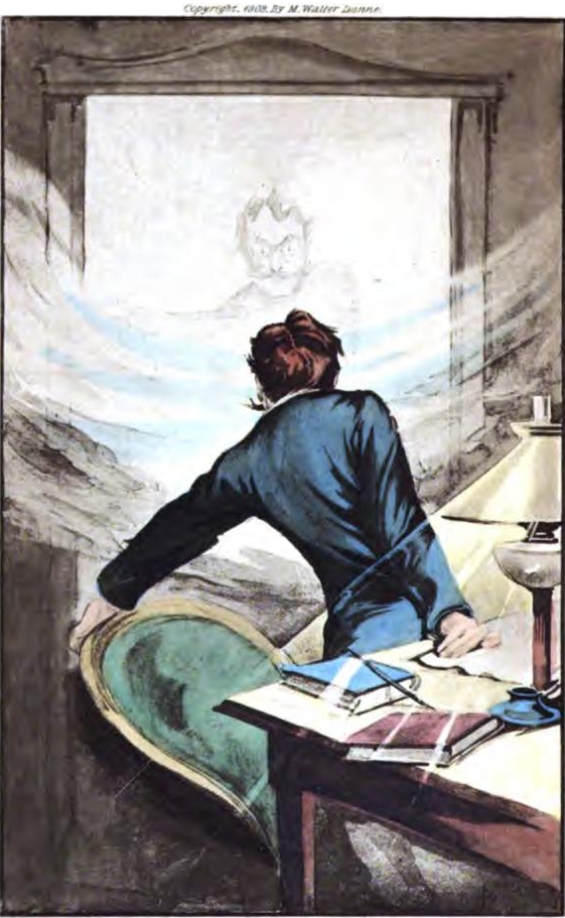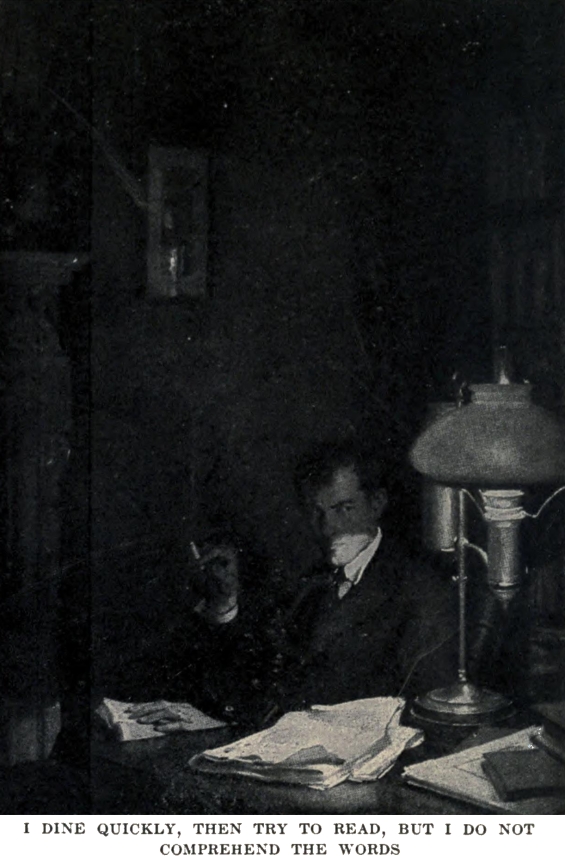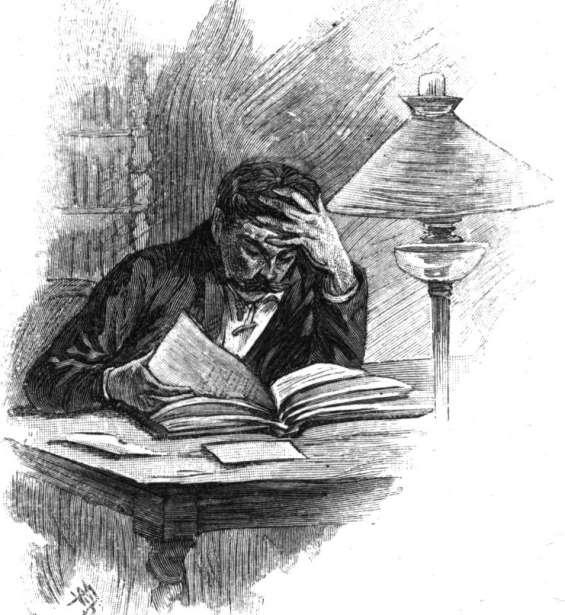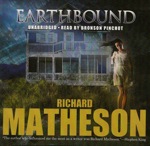
 Reading, Short And Deep #141
Reading, Short And Deep #141
Eric S. Rabkin and Jesse Willis discuss The Smell by Francis Flagg
Here’s a link to a PDF of the story.
The Smell was first published in Strange Tales of Mystery and Terror, January 1932.
Posted by Scott D. Danielson

 Reading, Short And Deep #141
Reading, Short And Deep #141
Eric S. Rabkin and Jesse Willis discuss The Smell by Francis Flagg
Here’s a link to a PDF of the story.
The Smell was first published in Strange Tales of Mystery and Terror, January 1932.
Posted by Scott D. Danielson

If I had to name the one story that’s influenced my reading, and thinking, most in last couple of years I’d name The Horla by Guy de Maupassant. It possesses my mind like a dark and deep tunnel running through my imaginative landscape – if you haven’t heard it yet you should. Below you’ll find my preferred version, but there are more readings, and adaptations HERE – and we did a whole podcast about it, that’s HERE.
One new thing though is this |PDF| which I made from a scan of an issue of Famous Fantastic Mysteries – it features the 1911 George Allan England translation.
 The Horla
The Horla
By Guy de Maupassant; Read by Gregg Margarite
1 |MP3| – Approx. 57 Minutes [UNABRIDGED]
Publisher: LibriVox.org
Published: July 11, 2009
First published in Gil Blas; Oct 26, 1886.



Posted by Jesse Willis

 The SFFaudio Podcast #125 – The Horla by Guy de Maupassant, read by Gregg Margarite (of LibriVox), followed by a discussion of the story – participants include Jesse, Tamahome and Jenny Colvin (of the Reading Envy blog).
The SFFaudio Podcast #125 – The Horla by Guy de Maupassant, read by Gregg Margarite (of LibriVox), followed by a discussion of the story – participants include Jesse, Tamahome and Jenny Colvin (of the Reading Envy blog).
Talked about on today’s show:
“c’est magnifique!”, is this Jesse’s favourite story from the 19th century?, H.G. Wells, is The Horla Science Fiction, aliens, ghosts, Guy de Maupassant is crafting our feeling on how the story should be interpreted, Mont Saint-Michel, Ladyhawke, Second Life, Normandy, Paris, France, ghosts, goats with human faces, biblical stories of possessed pigs, metaphor of the wind, the wind as a telekinetic force, invisibility, personal experience vs. faith, succubi, vampires, Jim Moon’s Hypnobobs podcast (reading of The Horla and Dairy Of A Madman), was Guy de Maupassant interested in science?, his prolific output, Sigmund Freud, is this a psychological drama?, the character in the movie vs. the short story, sleep paralysis and depression, is the unnamed protagonist of The Horla bioplar?, syphilis, H.P. Lovecraft, Benjamin Franklin, the character has a Science Fiction attitude (a disposition towards science), a story of possession (like in The Exorcist), glowing eyes, Rouen, “excuse my French”, external confirmation, diagnose yourself, São Paulo, Brazil, The Horla means “the beyond”, what lives beyond the Earth?, Jenny wasn’t thinking aliens at all, creatures from other dimensions, the Predator’s cloaking device, is the horla really Santa Claus?, hypnotism and hypnotists, post-hypnotic suggestion, confabulation, its a quasi-phenomenon, why can’t everyone be hypnotized?, Hamlet, did he burn down his house or did the horla do it?, noir, movies demand the defeat of evil, “Son Of The Horla and Spawn Of The Horla“, science and skepticism, who broke all the drinking glasses?, the Futurama version of a Twilight Zone episode,
“The vulture has eaten the dove, and the wolf has eaten the lamb; the lion has devoured the sharp-horned buffalo, and man has killed the lion with arrow, sword and gun; but the Horla is going to make of man what we have made of the horse and the ox: his chattel, his servant and his food, by the mere exercise of his will. Woe to us.”
Tamahome should read some H.P. Lovecraft, here’s H.P. Lovecraft’s description of The Horla:
“Relating the advent in France of an invisible being who lives on water and milk, sways the minds of others, and seems to be the vanguard of a horde of extra-terrestrial organisms arrived on earth to subjugate and overwhelm mankind, this tense narrative is perhaps without peer in its particular department.”
Lovecraft is using deep time to scare us instead of the supernatural, The Statement Of Randolph Carter, sorry I cant talk right now I’m being digested, Cthulhu’s guest appearance on South Park, the elements, space butterfly,
“We are so weak, so powerless, so ignorant, so small — we who live on this particle of mud which revolves in liquid air.”
a cosmic view, the Carl Sagan view, evil is everywhere, an allegory for science, Frankenstein, “men ought not meddle in affairs normally deemed to women”, the Frankensteinian monster, a warning against science vs. science is our only way of understanding the universe, we have one place to look and that is to science, the propaganda he’s pushing, “there are things we can’t explain”, gentlemen did science back then, Library Of The World’s Best Mystery And Detective Stories on Wikisource, the case of my body being haunted, Edgar Allan Poe, Diary Of A Madman, turn us into batteries, “this is a looking glass”, the main character holding a photograph of himself, foreshadowing, out of body experience, Tama fails the quiz of the lesson earlier, when we don’t know – don’t conclude, we ought not conclude anything from this scene, we are not supposed to know we know the answer, Harvey Keitel’s appearance on Inside the Actor’s Studio, becoming comfortable with the unknown, The Necklace by Guy de Maupassant, F. Scott Fitzgerald, Jesse proceeds to recount the entire plot of The Necklace, like a really sad O. Henry story, Somerset Maugham, Henry James, A String Of Beads, “Mais oui.”




Posted by Jesse Willis

 Earthbound
Earthbound
By Richard Matheson; Read by Bronson Pinchot
6 CDs – Approx. 6.5 Hours [UNABRIDGED]
Publisher: Blackstone Audio
Published: September 2010
ISBN: 1441756886
Themes: / Fantasy / Horror / Gothic Horror / Haunted House / Ghosts / Succubi / Marriage / Sex /
David and Ellen Cooper came to the lonely beach-side cottage in hopes of rekindling their troubled marriage. Yet they are not alone on their second honeymoon. Marianna, a beautiful and enigmatic stranger, comes to visit David whenever Ellen is away. Who is Marianna, and where has she come from? Even as he succumbs to her seductive charms, David realizes that Marianna is far more than a threat to his marriage, for her secrets lie deep in the past and beyond the grave. And her unholy desires endanger the life and soul of everyone she touches.
TV writer David Cooper is trying to revitalize his shaky marriage by returning with his wife to their original honeymoon location. While the Coopers do end up in the same sea-side resort, they find their original digs are unavailable and have to stay in a disused beach cottage. There, every time Ellen steps out, or goes to sleep, a sexy woman named Marianna appears and quickly seduces David. She fucks him harder than he’s ever been fucked and that’s the entirety of Earthbound‘s simple setup. The plot from there is but a dance between David’s realization of it and his doing something.
There are essentially four characters in Earthbound. Approximately ninety-five percent of the novel is set within the confines of the haunted cottage. It’s all told in a tight third person, over the shoulder perspective. We get the thoughts of David’s mind in elaborate detail and hear the other two characters exclusively from his POV. It becomes immediately clear to the reader that Marianna is not only a ghost but also a quasi-succubus. Matheson never actually names the marriage-ruining ghost as a sexual vampire, instead the characters only describe Marianna as simply the ghost of a depraved woman. It takes nearly a half-dozen sex sessions with the vitality draining Marianna, and several visits from a helpful neighbor (who lives just up the beach) to point this out to David. It then takes several more for him to actually believe what he’s being told and experiencing. David wants to believe he’s just been cheating on his wife with a mysterious stranger – but the evidence he’s been presented with is fairly convincing. In the meantime David gets into several, what I would call, disappointment swaps with Ellen, they go out to dinner once and have some unsatisfying sex. About half way through the book I began expecting that Ellen’s many convenient absences would be explained by her being haunted by an incubus – I was wrong on that score.
I don’t think this book is really all that horrible. The storytelling flows quite smoothly and likely achieves the purpose intended. Unfortunately it carries no lasting impression. Being a confirmed bachelor, I guess I just don’t want to read about people fixing their marriages at haunted seaside cottages. And, as for it being one of the gothic novels of psychology, I far prefer the depths of ambiguity in Henry James’ The Turn Of The Screw to the shallows of Earthbound. This is the fourth Matheson novel I’ve read, the first being I Am Legend |READ OUR REVIEW| and the second being The Incredible Shrinking Man |READ OUR REVIEW|. Like the former, Earthbound lacks the one thing I really cared about: a haunting message to go with its competent psychological character study. Like the second, The Incredible Shrinking Man, I came away from Earthbound thinking it was absolutely the kind of book I never need read again, a story premise with a character who was too wrapped up in his own psychology for me to care what was happening to him. I guess I just want some ideas to go with my characters and not to simply see them interacting or responding to a set of unusual circumstances. Earthbound, therefore, is most similar to the third Matheson novel I read, A Stir Of Echoes |READ OUR REVIEW|. If you liked A Stir Of Echoes I suspect you will enjoy Earthbound. Myself, I can only recommend the earth-shatteringly good I Am Legend and Matheson’s truly amazing short story Born Of Man And Woman.
Speaking of short stories, when Earthbound was first published (by Playboy Paperbacks in 1982) Richard Matheson used a pseudonym, “Logan Swanson.” Reading around the internet, I got the impression that he’d balked at some editorial changes in the Playboy Paperbacks edition – and so declined to have his real name put on the cover. But, the story is probably a little more complicated than that. After doing some more digging I noted that one Amazon reviewer had this to say: “…not a lot of people realize this, but this book started out as a short story written very early in Matheson’s career.” Noting that the succubi in fiction article on Wikipedia includes one Matheson story, called The Likeness Of Julie. I dug up my copy of Shock II (it’s also collected in Hot Blood: Tales Of Erotic Horror) and read it. The Likeness Of Julie, which is just 9 or 10 pages, has a bit more of a punch than Earthbound, and is clearly the predecessor to a novelized re-working. Interestingly, it too was first published “as written by Logan Swanson” in a 1962 anthology called Alone By Night. And the pseudonym there was not likely due to a protest, but rather the fact that there was another story by Matheson in the collection. In any case, this Blackstone Audio edition uses the author’s full text version of Earthbound.
Bronson Pinchot, has been recording up a storm for Blackstone Audio of late (there are currently 44 titles with him as a narrator). For Earthbound he does little extraordinary other than voicing three females, two carnal women and one ethereal succubus. Surprisingly, he doesn’t have to stretch very much for in this small scale novel; he pretty much makes himself invisible in the text. I’d like to see him tackle some more meaty material.
Posted by Jesse Willis